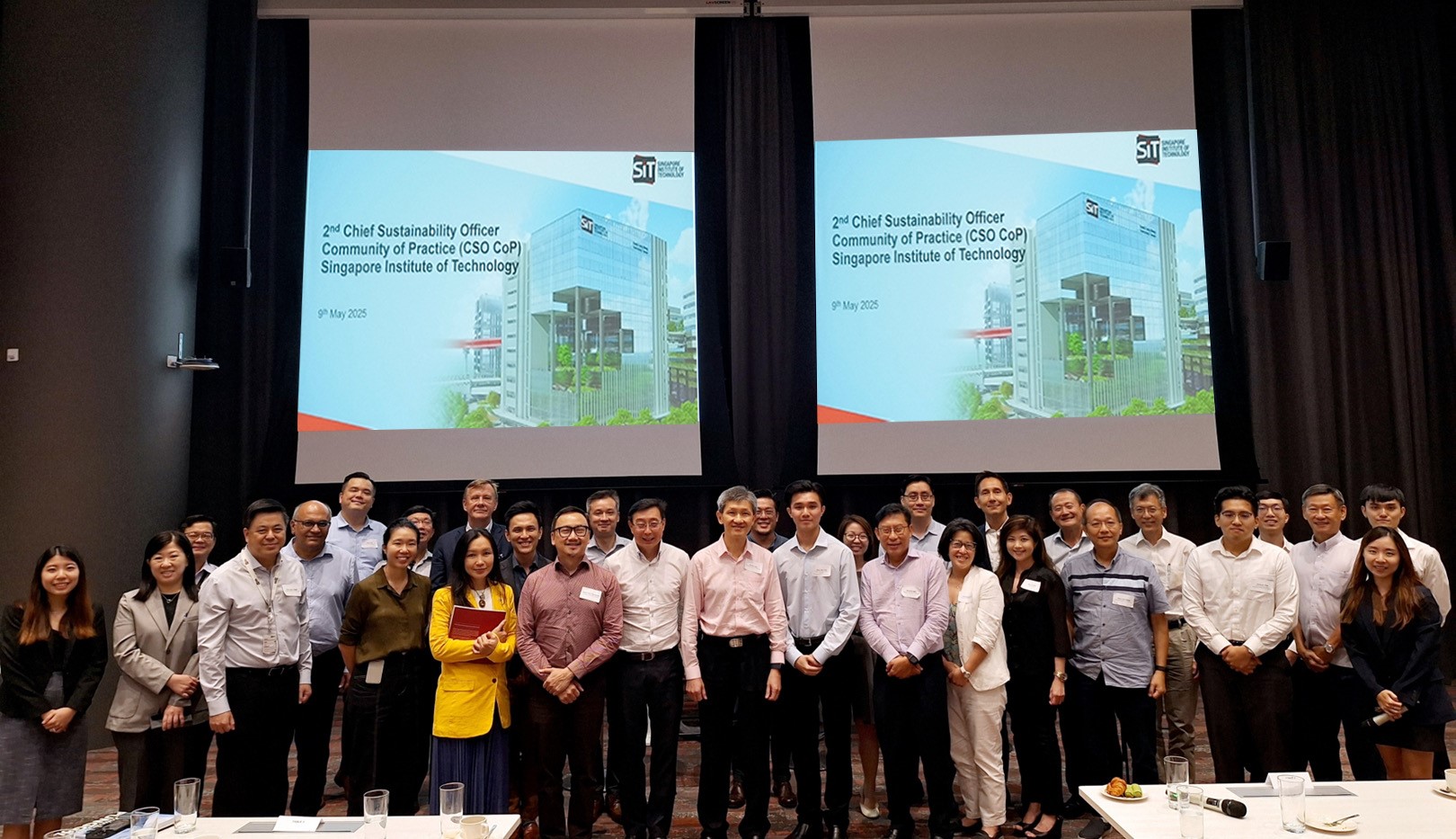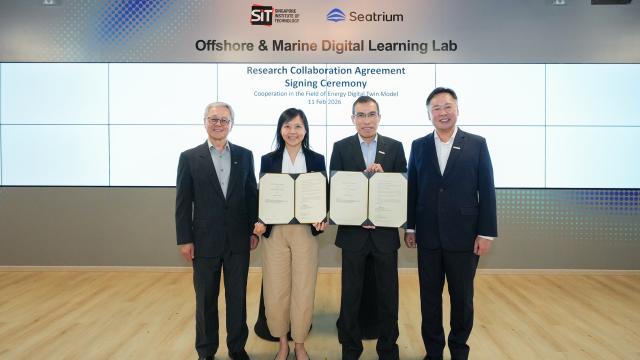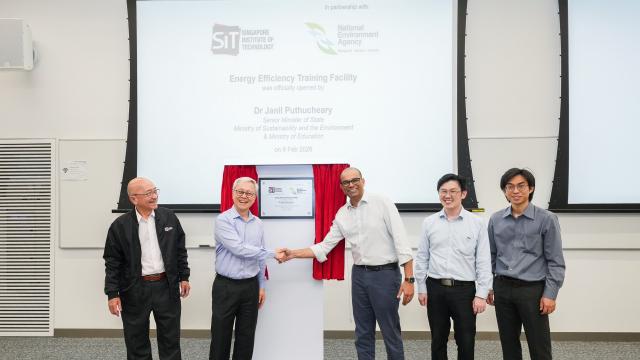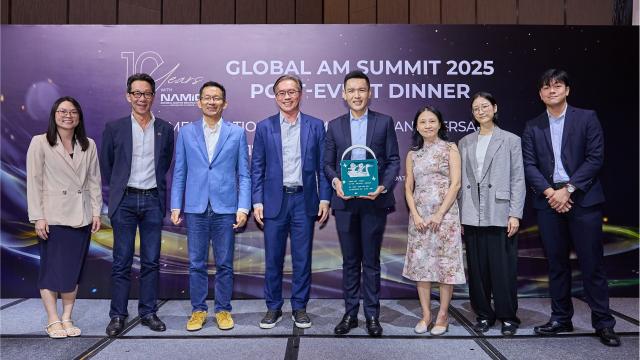The environmental crisis is a shared challenge, and tackling it requires urgent action from leaders in industry, academia and the public sector. Marked annually on 5 June, World Environment Day serves as a timely reminder of the need for collective action, spotlighting global efforts to beat plastic pollution and build a more sustainable future. Echoing this call, SIT hosted its second Chief Sustainability Officer (CSO) Community of Practice (CoP) in May 2025, uniting leaders to advance sustainability governance across sectors.
A single cataract surgery at the Ang Mo Kio Specialist Centre in Singapore takes just 15 minutes. But astonishingly, it generates about three kg of unrecyclable waste. With some 2,400 cataract surgeries performed annually, that amounts to 7,200 kg of waste produced each year, much of it consisting of plastics such as infusion lines and wrappers. Plastics, which account for 25 per cent of hospital waste in Singapore, are a major contributor to global problems such as biodiversity loss and climate change.
Fittingly, this year’s World Environment Day—observed annually on 5 June—is themed “Beat Plastic Pollution". This global campaign aims to unite countries, corporations and communities in the effort to tackle plastic pollution and its effects on the environment.

The effort to beat plastic pollution continues to live on. (Photo: Unsplash)
One thing is clear: Given the scale and complexity of sustainability-related challenges, strong sustainability governance in the public and private spheres is crucial. This is what SIT is catalysing with its second Chief Sustainability Officer (CSO) Community of Practice (CoP), held on 9 May 2025 at the SIT Punggol Campus.
The event, which saw 16 sustainability leaders in the public, private and academia sectors in attendance, underscored the urgent need for systemic change at the policy and organisational level. It featured a diverse line-up of speakers from non-profit organisations, healthcare, the public sector and SIT, all of whom agreed that addressing the deepening environmental crisis requires not just a shift in mindset, but also cross-sector collaboration and long-term capacity-building.

Leaders in sustainability shared their perspectives on building strong sustainability governance. (Photo: SIT)
When Climate, Health, and Plastics Collide
Speaking at the event, Associate Professor Wong Hon Tym, Clinical Director at the Centre for Healthcare Innovation (CHI), emphasised that the climate crisis is a healthcare crisis.
The healthcare sector is a major source of emissions in Singapore, accounting for 3.4 per cent of the national total in 2015. This places the country among the top per-capita healthcare emitters globally.
Rising heat drives cardiovascular and heat-related illnesses, while allergens worsen respiratory conditions, said A/Prof Wong. Most critically, this deepens existing health inequities, hitting the vulnerable communities the hardest. Compounding the issue is the sector’s heavy reliance on single-use plastics, driven by infection-control standards and the need for sterility.
Moderating the discussions was Ms Neo Gim Huay, a member of SIT’s Board of Trustees and Managing Director at the World Economic Forum. (Photo: SIT)
While national targets have been set under the Paris Agreement, which saw Singapore commit to reducing its emissions to around 60 million tonnes of greenhouse gas emissions by 2030, the reality is that there is a limit to what Singapore can do to curb its domestic emissions, said Mr Ananda Ram Bhaskar, Deputy Chief Executive Officer (Environmental Protection) of the National Environmental Agency (NEA).
The island’s dense urban landscape, limited land availability, and low wind speeds restrict the use of alternative energy sources such as wind and hydropower. Instead, it relies heavily on regional and global efforts to enhance sustainability, such as importing low-carbon electricity and accessing overseas carbon storage sites.
All in all, the green transition could shape up to be a “messy” one, said Ms Neo Gim Huay, Managing Director at the World Economic Forum and member of SIT’s Board of Trustees. “There's no predetermined pathway that's going to work… Every country and organisation will need to find its own path forward,” Ms Neo added as she moderated the discussion.
Beyond embedding sustainability in hard skills like accounting, she stressed the need to rebuild humanity’s connection with nature through a new kind of “EQ”, or “Ecological Intelligence”. This is especially pertinent for the younger generation who have grown up in an urban environment with limited exposure to nature.
Strengthening Sustainable Practices
Despite the sobering reality of the environmental crisis, innovation could provide a spark of hope. A/Prof Wong shared how CHI’s “Eye Can Recycle” initiative has reduced waste in cataract surgeries by 25 per cent, with plans to scale this up to 40 per cent within the next three years.
He also cited how the COVID-19 pandemic led to stringent infection-control procedures that continue to result in lots of waste. “Thanks to COVID, healthcare has had an ‘over-immunity’ to being green,” he said, adding that there was a need for a mindset shift that balances environmental responsibility with uncompromised hygiene.
At the national level, Singapore established an International Carbon Credits Framework in 2022 that allows firms to offset taxable emissions. More recently, it formalised its sixth carbon credit pact with Rwanda in 2025, enabling the nation to purchase more carbon credits and offset its emissions.
A/Prof Ethan Chong was part of the panel of sustainability leaders who discussed the role of education in advancing environmental goals. (Photo: SIT)
Education is also emerging as a powerful lever for change. At the event, Associate Professor Ethan Chong, Head of Sustainability (Education and Research) at SIT, shared plans to strengthen sustainability education at SIT. These efforts aim to better prepare future leaders in the environmental, social, and governance (ESG) space and beyond, with a focus on bridging classroom learning and real-world practice. One key initiative is the Graduate Certificate in Sustainability Principles and Practices, which equips professionals with practical sustainability skills across business, accounting, and finance.
It is clear that addressing sustainability requires collective effort. With medical plastics accounting for 2 per cent of global plastic production, the urgency to reduce waste is undeniable. Through collaboration, innovation and education, SIT and its partners are laying the groundwork for a more sustainable future.















![[FA] SIT One SITizen Alumni Initiative_Web banner_1244px x 688px.jpg](/openhouse2025/directory/openhouse/centre-professional-communication/centre-professional-communication/centre-professional-communication/directory/sites/default/files/2024-12/%5BFA%5D%20%20SIT%20One%20SITizen%20Alumni%20Initiative_Web%20banner_1244px%20x%20688px.jpg)


